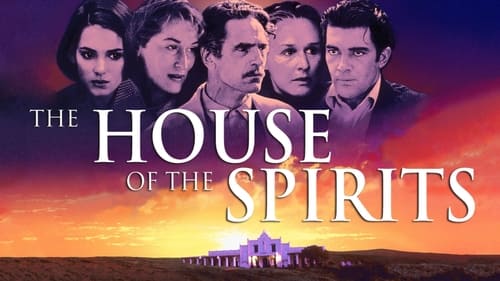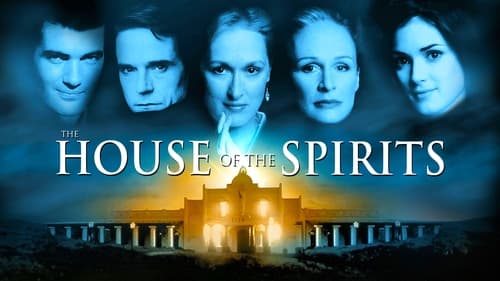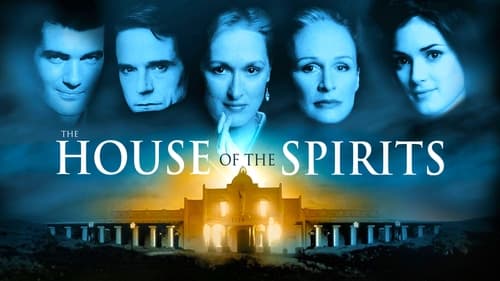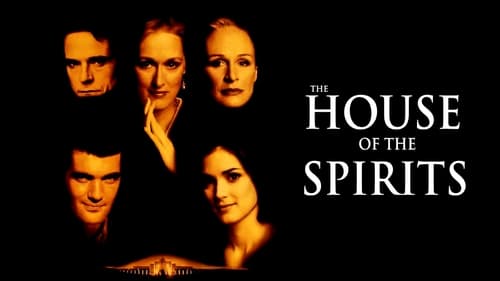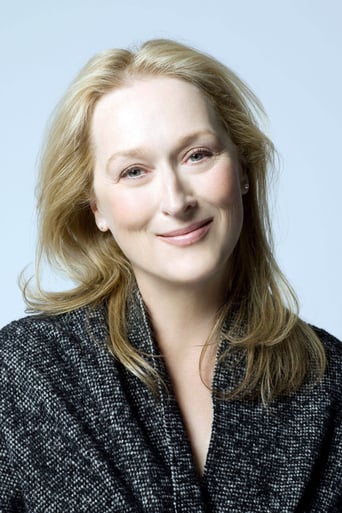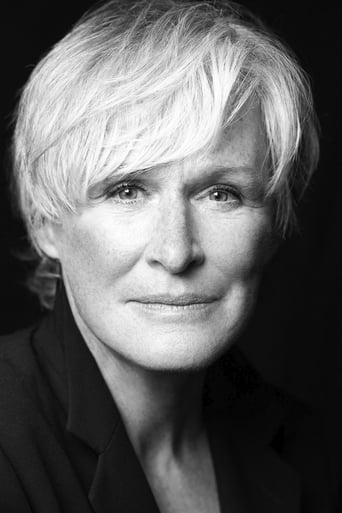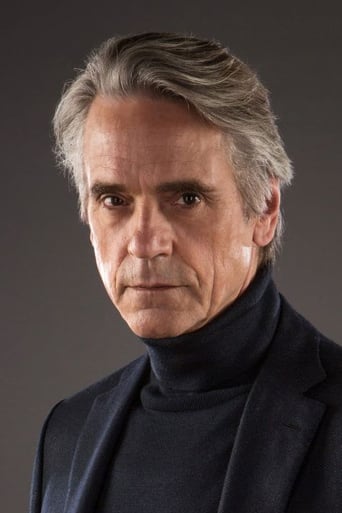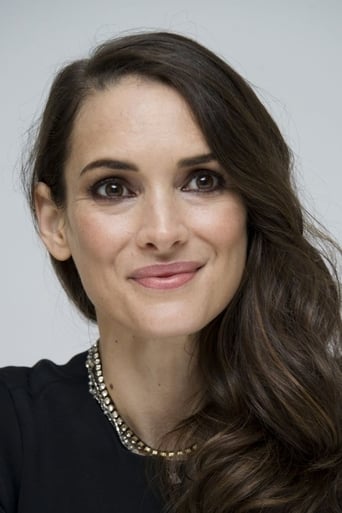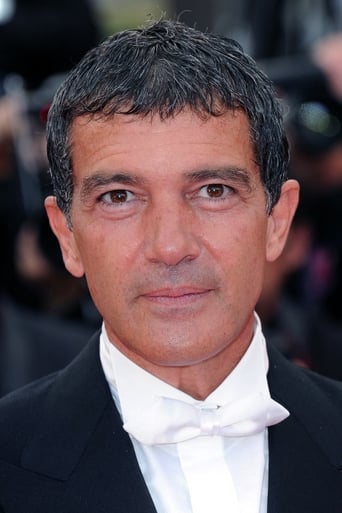Pluskylang
Great Film overall
Anoushka Slater
While it doesn't offer any answers, it both thrills and makes you think.
Tobias Burrows
It's easily one of the freshest, sharpest and most enjoyable films of this year.
omarelshiekh
The house of the spirits,the movie with no single mistake,I don't think any filmmaker could be more sincere,sensitive,deep and attractive more than the crew members of this film,specially Bille August,Jeremy Irons,Hans Zimmer and all the cast members,in outstanding harmony they gave us the core of all the feelings of Allende's Terrific novel.Watch the movie,mind the difference between the nature of a novel and the nature of a movie and don't make comparisons and then you will find yourself completely taken by this masterpiece,if not then better watch different type of movies
clynn05
This was a silly movie - the mother had to be at least 10 years younger than the father, and yet they had her age so much quicker and die first ??The main character was a horrible man - and yet the mother says to the daughter, about the father, 'it isn't malice'... What !? He is nothing but malicious. The character was never shown to do one good thing.There is no romanticism here... masochism maybe... He was a horrible man and I could see no reason why Clara would have loved him.There was no point to this movie, unless it is to encourage women to punish themselves by loving evil men.Watching this was a big waste of my time.
Blueghost
According the BBC's documentary "The Other 9/11" (a film looking back at the coup in Chile in 1973), half the nation, half the people, supported Pinochet, or rather were opposed to Allende's massive nationalization of private property, and against the government providing a larger group of social services at the expense of private industry.With that in mind, it means that the other half supported Allende. The nation was split down the middle.So what does that have to do with this film? This film shows a Chilean Hacienda owner brutalizing women, and forcing himself on others to get what he wants. And then, towards the end of the film, he has a change of heart.Huh.The problem here is that the conservative right wing, of which Jeremy Irons' character is a part, are shown as sexually repressed or twisted individuals. Whereas the free and family loving faction (predominantly women) are shown as normal and, on that note, having a kind of divinity which helps them overcome the repressions of a fathers right-leaning home dictatorship. Jeremy Irons, Meryl Streep, Antonio Banderas, Glenn Close and other contemporary actors form an all star cast for what really is an exceptionally well put together film.The problem comes down to the fact that it is factually flawed to push an agenda, as are a lot of films of this ilk. Like I said in my opening, half the people actually did support Pinochet and his coup. That's not to excuse the abuses of the Chilean military, but it should give people pause to wonder why there was such a split in Chilean society. This is never addressed.What is shown is Jeremy Irons' character being what the director believes is an archetypal successful businessman. Well, I suppose if that were true, then the founder of American Airlines, ABC, Microsoft, Intel, Del Monte Foods, Goodyear Tires, Lurssen Yachts (and a host of private firms world wide) were all sexually repressed rapists who impregnated women so they could give birth to pedophilia rapists. Further, that said businessmen frequented prostitutes to satiate sexual desires.For anyone who owns a business, has gone into business for themselves, or who has worked into a management position, ask yourself, how true is that of you? How about your competition? Was Steve Jobs or Bill Gates molded from such DNA?Answer; no.To the director; if you're going to make a film about a familie's personal history regarding the Chilean coup of 1973 (which I remember), then make that film. Don't push some political agenda to share your skewed version of how you think things should be. Make the film of how things were.A finely crafted film. It looks good, it moves well in the story department, it does get pretty hokey with the spirituality (borderline laughable), but otherwise it's an okay piece of cinema.But, as a pro-business American who is hawkish on international politics, I think this movie's theme is poor at best. Tragically flawed and an outright lie and shame upon the director at worst.
CalvinValjean
The first time I saw THE HOUSE OF THE SPIRITS, I had a similar reaction to what most critics seemed to have. I felt the movie was bad, but couldn't say why exactly. It's hard to find fault in a movie with such an esteemed cast, such great sets and cinematography, etc. I knew it was based on a famous novel, so I figured the problem must have been in the adaptation.Upon reading the novel and then going back to the film, I realized something interesting: the film starts out as a faithful adaptation before losing its way, but the biggest issue is the tone.The novel's style of magical realism is, right from the start, difficult to adapt to film. There's green hair, there's magic remedies, and there's a very darkly humorous tone. The film on the other hand is very bleak and brooding, with only some slight supernatural element, which is kind of shrugged off. Roger Ebert, who always has a perfect way of articulating the best criticism, worded it best: "Magic realism, which informs so many South American stories, is treated here as a slightly embarrassing social gaffe, like passing wind. Clara's gifts are not made integral to the story; the filmmakers see them more as ornamentation." For example, in the book, Severo and Nivea die in a car accident and Clara keeps her mother's decapitated head in the basement. Years later, when Clara dies, Esteban tells his servants "Well, we might as well bury my mother-in-law's head now." Moments like that are missing, and instead we just have a scene of Severo and Nivea in a random car accident in the film, and are then never mentioned again. Why even bother having the car accident at all? And why waste Vanessa Redgrave in such a small role? Now this leads into another issue: the most infamous criticism of this film is that it stars a bunch of "gringos" (Jeremy Irons, Meryl Streep, Glenn Close, and Winona Ryder) as Chilean characters. At first glance, you might think this is a shallow thing to criticize: actors play characters of different ethnic backgrounds all the time, nor is there any one way that a Chilean person should "look." But I think this criticism is actually a misdiagnosis of a bigger problem. The problem isn't that these actors are all Anglo; it's the fact that they play their characters in a very Anglicized way for an Anglo audience. They mispronounce names like Tres Marias ("Trays Muh-ree-ahs") and Esteban ("Estuh-baan") and say them all as if these names are foreign to them. Irons, who is British, sounds American while Close, who is American, sounds British. Winona Ryder's character is presented as an all-American girl. There's even a scene towards the end, while Blanca is being tortured and Alba waits for her at home, where Alba is eating out a Kentucky Fried Chicken box in the 1970's! (KFC didn't start opening stores in Chile until 1992. Yes, I actually looked it up out of curiosity). Now you might say "Who cares if they show a KFC box? That's nitpicking." It might not seem important, but on a subtextual level, it's significant. The filmmakers are trying to dilute the Hispanism of the story and create the mindset that this could easily be happening in the US. All of this adds a feeling of displacement to the movie. Because it loses its Chilean and Latino identity, the politics lose their context. What is the coup at the end all about? Why does it happen? What happened to the workers at Tres Marias? Why was Pedro III an enemy of the military's?When you take this story, remove its Hispanic context and magic realism, what you're left with is just a domestic drama, which is less interesting than its book counterpart when it is simplified. The adaptation's biggest change is the removal of an entire generation and combining Blanca and Alba into one character. This completely changes the third act and it now makes no sense for Esteban to help Pedro III escape. In the book, Esteban joins forces with Miguel as they both care about saving Alba. In the film's version, joining forces with Pedro III will in no way have any affect on saving Blanca. The impact of Esteban's relationship with Alba is also lost as she is reduced to only a small child in the film and not given much character. In the book, Esteban has affairs with multiple women at Tres Marias and fathers many children, which everyone is aware of. In the film, he just randomly commits violent rape one day in a very abrupt scene, and then completely forgets about it until a son shows up one day. Because of the removal of an entire generation, Esteban III in the book is Esteban II in the film, and his character is given the Hollywood archetypes of a perverse and disturbed villain rather than as the symbol of lineage of violence he was in the book. In addition to this you have the removal of Blanca's brothers from the book and a climax that doesn't play very dramatically, and the resulting story is very fractured and loses the epic 3-generation sweep of the novel.I am left wondering if any film could have been made of this book, which has so many characters and spans many different episodes. Regardless, this film, and its serious tone, do not suit the book at all, and just leaves audiences wondering what the story they just saw was all about.

